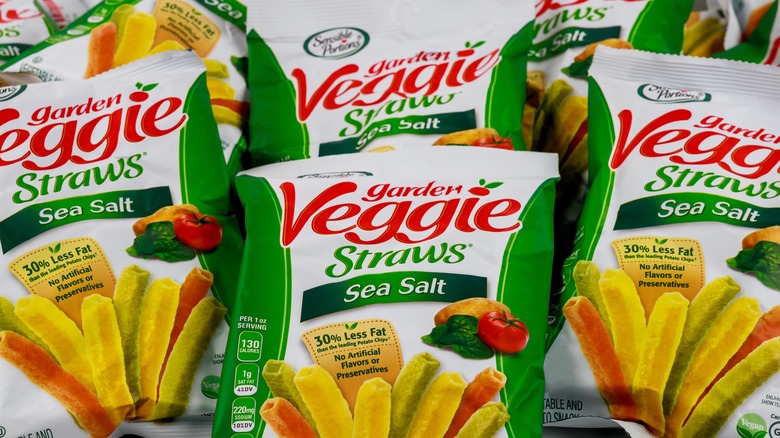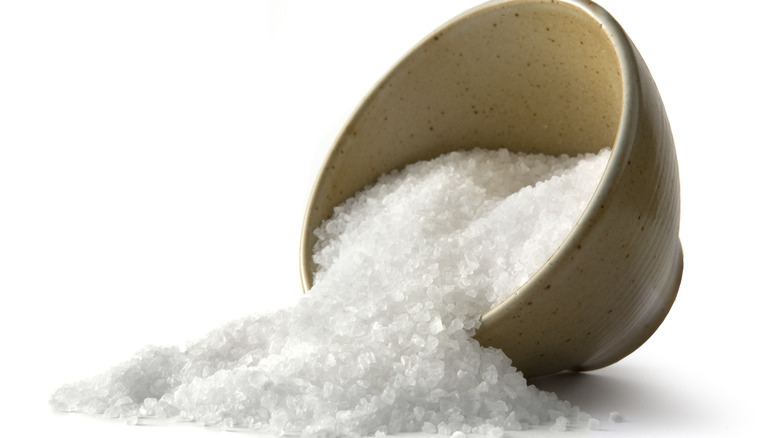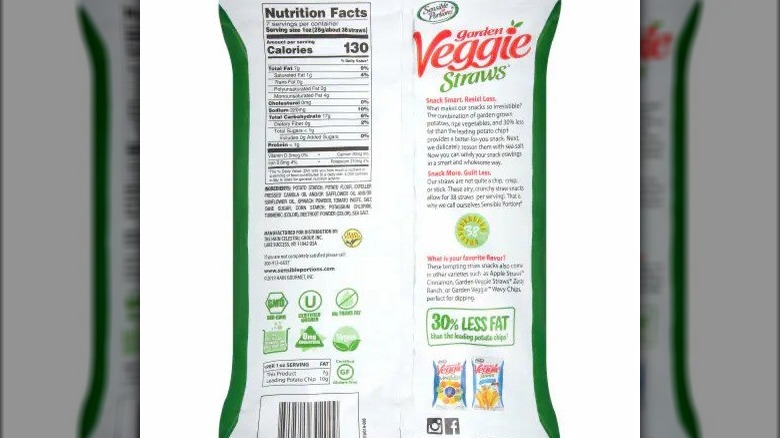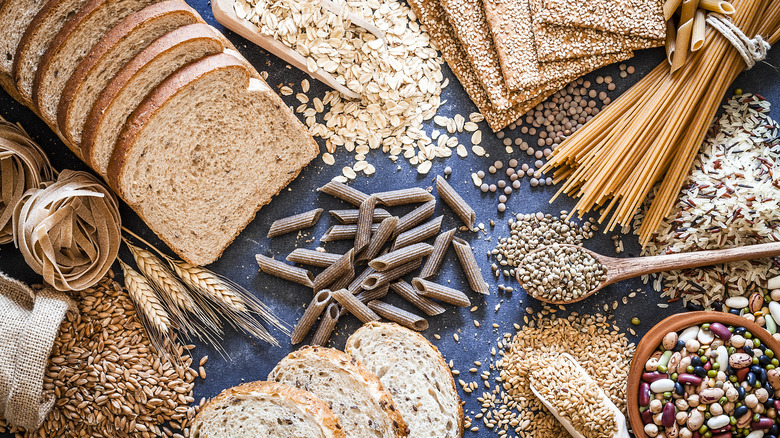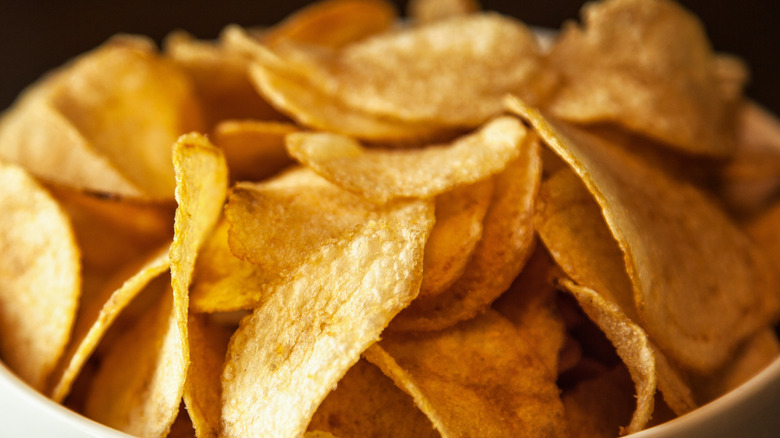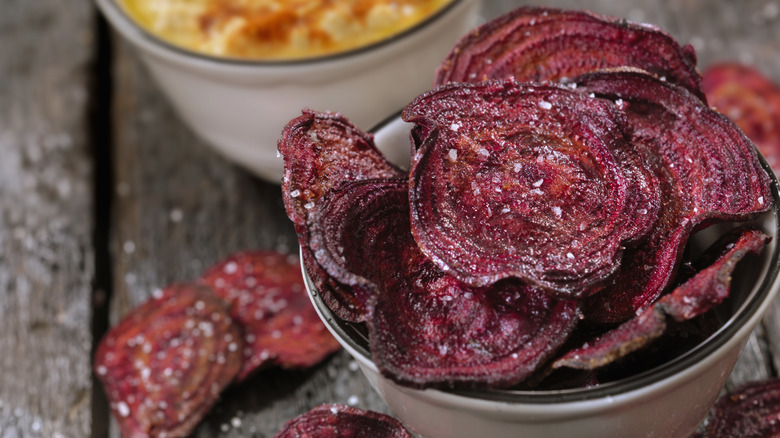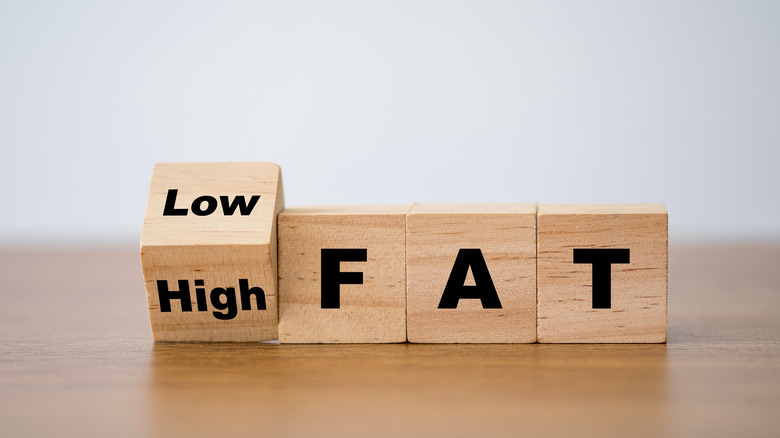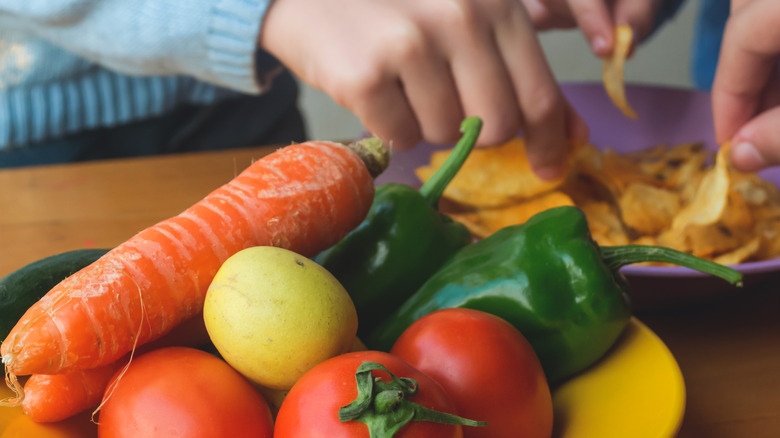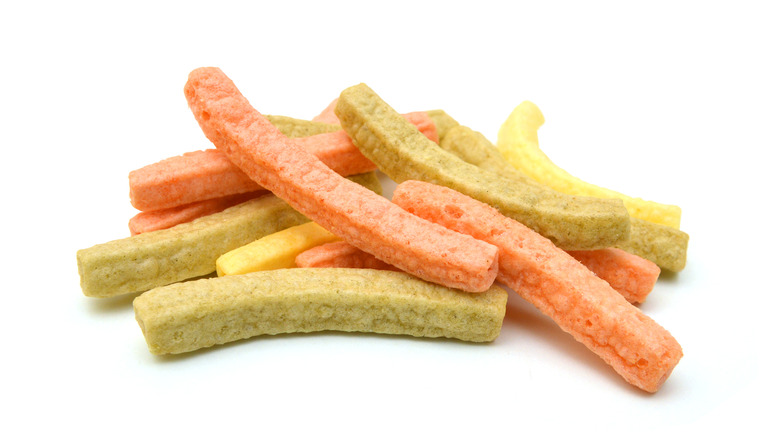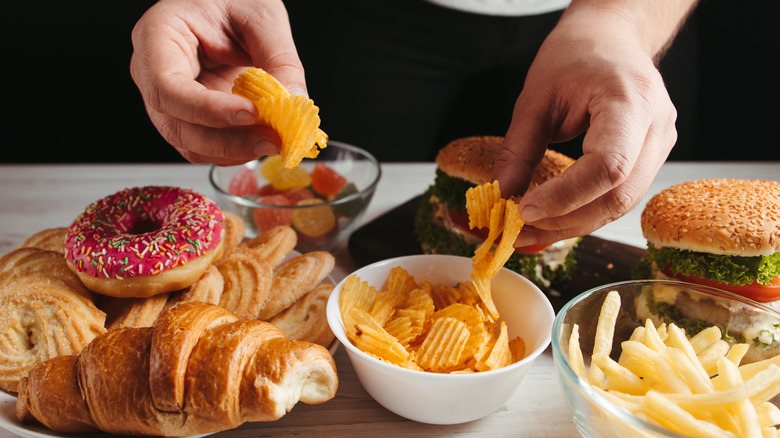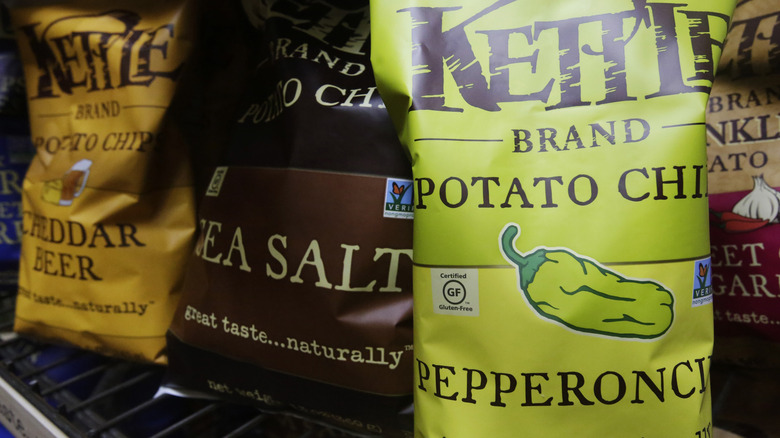Why You Should Think Twice Before Eating Garden Veggie Straws
When it comes to snacking, you have lots of choices. Of course, there are the ones you know are healthy – like homemade peanut butter, a piece of fruit, or a handful of nuts — but there are also endless assortments of prepackaged snacks lining the shelves of your local grocery store. From chips and crackers to cookies and candy, there are snacks for every type of craving. But you also likely know that chowing down on ultra-processed, salty, or sweet treats to your heart's content isn't actually all that likely to make your heart content. According to research published in the American Journal of Lifestyle Medicine, overconsuming ultra-processed foods is linked to increased intake of fat, salt, and sugar, all of which are associated with higher risks of heart disease, diabetes, and other chronic illnesses. So it makes sense to seek out the "sensible snacks" that help you calm your cravings without putting your health at risk.
So when you walk down the snack aisle and see the colorful, crunchy Garden Veggie Straws calling out to you with key marketing phrases like "30% less fat" and "no artificial flavors or preservatives" on the label, it's only natural to think you're making a smart choice. But before you fill your cart with a couple of bags, it's important to look a little closer: Garden Veggie Straws may not be the healthy snack option you think you're getting. Here's why these are "healthy" snacks you shouldn't buy.
They're not really an alternative to potato chips
First and foremost, if you're buying Garden Veggie Straws because you want to cut back on eating regular potato chips, you may want to take a look at the Veggie Straws' ingredient list. The very first two ingredients? Potatoes. To be specific, not even regular potatoes, but potato starch and potato flour — so, parts of the potatoes after they've been processed.
This means that while the Veggie Straws do include additional ingredients, like spinach powder and tomato paste (which, again, are processed versions of the actual veggies), they're really just a potato chip that's been reconfigured with a few different additives and colors. If your goal is to cut back on potato consumption itself (say, for instance, if you're watching your carbohydrate intake), choosing Garden Veggie Straws over Classic Lay's (or whatever your go-to potato chip is) isn't some sort of magical shortcut to snacking bliss. You're ultimately just trading out one potato chip snack for a different iteration of the same thing.
Garden Veggie Straws high in salt
It doesn't take a genius to figure out that one of the reasons snack foods are so addicting is because they taste good — and one of the ways companies make sure their snacks taste good is to fill them with salt. And while Garden Veggie Straws may have a lower fat and calorie content than some other common chip options, they actually have a higher salt content. In fact, a 1-ounce serving of Veggie Straws has 220 milligrams of sodium, which equates to 10% of the recommended daily value.
This is significant because according to the Centers for Disease Control and Prevention, about 90% of the U.S. population consumes too much sodium, most of which comes from processed and restaurant foods. And considering high sodium intake is linked to high blood pressure, heart disease, and stroke, it's important to avoid foods that have a high level of added salt. While 10% of the daily recommended value may not seem like a lot, you have to consider what other foods you're eating throughout the day, and whether you're really just eating a single serving of Veggie Straws (it's easy to eat more than an ounce without thinking about it). Then, you have to ask yourself if the added salt you're taking in is really worth downing a serving (or more) of the snack.
Garden Veggie Straws are high in carbs
There's no way around it — most of the snack foods we love tend to be on the high side when it comes to carbohydrate content, and Garden Veggie Straws are no different. Again, this comes back to the food's primary ingredient — potatoes. Potatoes are a vegetable naturally high in carbohydrates, so any snack derived from the spud is going to be higher in carbs as well. In the case of the Veggie Straws, a single (1-ounce) serving of the snack has 17 grams of carbohydrates. This is more than (although similar to) Lay's Classic Potato Chips, which contain 15 grams of carbs per serving.
Of course, carbohydrates are an essential nutrient and shouldn't be vilified, as they're necessary for overall health and well-being. As such, a single serving of Veggie Straws should be able to fit into most healthy diets without a problem. That said, you again have to think about your food choices in the context of your entire diet — are you overconsuming carbohydrates (especially processed carbohydrates) as a whole? If so, you just need to ask yourself if the 17 grams of highly-processed carbs found in Garden Veggie Straws are really worth it, or if you'd be better off consuming those carbs in the form of unprocessed or minimally-processed and fiber-rich carbs, like oatmeal or brown rice.
You won't find much fiber in a bag of Garden Veggie Straws
Fiber is one type of carbohydrate that's considered particularly good for you. Your body can't actually digest fiber, so it passes through your intestinal system. Soluble fiber, which dissolves in water, helps slow digestion and manages blood sugar levels while insoluble fiber (which doesn't dissolve in water) helps keep your system moving, preventing constipation by scraping things along. This is why consuming a diet that's higher in fiber is considered so healthy, and why choosing foods and snacks that contain fiber is important.
Now for the not-so-great snacking news. Garden Veggie Straws, unfortunately, don't contain any fiber. This is important to keep in mind when you think about what the brand is "selling." If they're positioning the snack as a "veggie alternative," real veggies (even potatoes) provide high levels of dietary fiber. For instance, a single unpeeled carrot has two grams of fiber, while a baked potato with the skin on has five grams of fiber. Even Lay's Original Potato Chips contain a gram of fiber per serving. The point is, while real veggies are providing a wealth of nutritional value to your diet, Veggie Straws come up short, especially when it comes to fiber.
They contain less protein than regular potato chips
It's a safe assumption that when most people reach for a bag of chips, they're probably not doing it to increase their protein intake. It should come as no huge surprise that chips, in general, are lower in protein given that they're typically made of potatoes, corn, or other grains. That said, unprocessed or low-processed vegetables and grains often do contain low levels of plant protein. For instance, most fresh, frozen, or canned vegetables contain about two grams of protein (give or take) per serving. And once again, even Lay's Classic Potato Chips contain 2 grams of protein per serving.
Garden Veggie Straws, on the other hand, provide less than a gram of protein per serving. While, admittedly, you know you're not going to be eating the equivalent protein found in a steak when you toss back a handful of chips, the lack of protein found in Garden Veggie Straws is just another reason to ask yourself, "What am I really gaining by eating this snack?"
They don't contain whole veggies like some options
When it comes to choosing "veggie chips," you likely want to feel like you're enjoying at least some of the same benefits of real vegetables while enjoying your snack. There are actually quite a few snack options available that simply slice up real veggies (like beets, kale, sweet potatoes, or peas), season them, bake or fry them, and package them up. While the processing these snacks undergo still tends to steal some of the original food's health benefits while adding extra salt, fat, and sugar, the overall nutrients remain largely untouched.
Take, for instance, Rhythm Organic Kale Chips. A single serving contains three grams of fiber, five grams of protein, and substantial levels of calcium, iron, potassium, vitamins A and K. The chips also contain a high level of sodium and fat, but you can feel good about many of the nutrients you're consuming.
Garden Veggie Straws don't contain any whole vegetables at all. Not only do the potatoes come in the form of potato starch and flour, but the "added veggies" come in the form of tomato paste, spinach powder, and beetroot powder. So you really can't kid yourself into thinking you're eating veggies when you grab a handful of these straws.
They may contain 30% less fat ... but does it matter?
One of the marketing tools Garden Veggie Straws uses is the "30% less fat" claim. While certainly, the snack's seven grams of total fat is 30% less than Lay's Classic Potato Chips' 10% total fat, there are a couple of things to keep in mind. First, the low-fat diet craze that boomed in the '90s as a method for people to control their weight has been debunked as a "failed experiment," according to Harvard's T.H. Chan School of Public Health. Fats are not inherently bad, and certainly, fat itself is an essential nutrient that should be included in a healthy diet.
Second, while the total fat contained in Veggie Straws is lower than most other potato chips, the "bad fats" (saturated and trans fats) in Veggie Straws and Lay's Original Potato Chips are practically equal — Veggie Straws have one gram of saturated fat to the potato chips' 1.5 grams, and both snacks contain zero grams of trans fats.
Finally, the fat found in a single food item is unlikely to make a significant difference in your total fat intake or overall diet. So while it's still important to be smart about the nutrients you're taking in, and to avoid overconsuming fats, the three grams of fat that differentiate a serving of Veggie Straws from regular chips is like a drop in the bucket when looking at your overall food intake during the course of weeks, months, or years.
Garden Veggie Straws are not replacement for real veggies
Even when comparing Veggie Straws to other chips (made from whole potato, rather than just, say, potato starch), Veggie Straws fall short. In fact, when Healthline compared the nutritional value of Veggie Straws to Lay's Classic Potato Chips, Tostitos Original Tortilla Chips, and Terra Sweet Potato Chips, all four products had similar levels of fats and sugars, and only Veggie Straws failed to meet the USDA's nutrient standards for snacks and side dishes in terms of sodium content.
And as tempting as it might be to switch out your fruit and veggie servings for crispy, crunchy, salty chips, there's really no comparison between the two. Real fruits and veggies are packed with vitamins, minerals, fiber, and phytonutrients that help support a healthy lifestyle and ward off chronic diseases. They're also typically low in calories, and when they contain fats, they're usually a healthy, plant-based version. A diet filled with real fruits and vegetables is considered one of the best ways to bolster your well-being.
Veggie Straws aren't made of whole vegetables at all. As such, they've largely been stripped of the wealth of good-for-you nutrients found in the real deal. For instance, Veggie Straws are made of potato starch and potato flour, not whole potatoes. Where a single whole potato contains two grams of fiber, 1.1 milligrams of iron, 620 milligrams of potassium, 27 milligrams of vitamin C, and .2 milligrams of vitamin B6, a serving of Veggie Straws has zero grams of fiber, and only .6 milligrams of iron, and 210 milligrams of potassium with none of the other nutrients. You really can't compare the benefits of real potatoes to Garden Veggie Straws.
They're highly processed
Eating processed foods has become the norm for much of Western culture. From frozen dinners to canned vegetables to pretty much everything on the snack aisles of the grocery store, many foods have undergone some sort of processing prior to their consumption. Not all processing is bad. Minimally processed foods, like bags of frozen veggies or pre-washed bagged salad greens, are largely untouched from their original state and still retain almost all of their original nutrients.
But ultra-processed foods (like Garden Veggie Straws) are a different story. This is because they contain additives and ingredients intended to enhance the flavor and extend shelf life, which can ultimately contribute to a less healthy diet. These foods tend to contain too much salt, sugar, and fat with fewer vitamins, minerals, and good-for-you nutrients. Diets that consist largely of ultra-processed foods are also linked to major health problems, like cancer.
While the occasional highly-processed treat is unlikely to do major damage, it's important to consider how many processed foods you're consuming and whether it's smarter to reach for a bag of veggies with some hummus dip instead of a serving of Garden Veggie Straws.
They're a snack food that should be eaten in moderation
As a general rule, all snack foods should be eaten in moderation. There's nothing inherently wrong with grabbing a bag of chips or a cookie every now and then, but it's important to remember that these are treats, not dietary staples. Certainly, if you're a big fan of Garden Veggie Straws, there's no reason you can't enjoy them as part of your dietary routine, but you should be thinking of them in the context of your overall food intake. If you're eating more snacks and goodies than real, whole foods, then you should consider whether or not the Veggie Straws deserve a place in your day-to-day diet.
Most Americans would be better served to keep whole-food snacks (or minimally processed snacks) on hand when they're feeling hungry, rather than highly processed options. A handful of nuts and a piece of fruit, a boiled egg and a bag of celery, or a can of tuna stuffed into a pita pocket are all options that are filling and nutrient-dense. Not only will these snack options provide more nutrients, but in some cases, may even be a cheaper option than snacks of the bagged variety, such as Garden Veggie Straws.
They just don't taste as good as other highly processed snack foods
When you're looking at your overall diet and trying to decide which foods should make the cut, it's important to allow space for a few "splurges." But when you give yourself a pass to enjoy one of your favorite treats, you should really enjoy your favorite treat. In other words, if you're going to grab a serving of chips, it should be a serving of chips you really love, not one you sort of tolerate in the name of having something moderately "healthier." When comparing Garden Veggie Straws to Lay's Original Potato Chips or your favorite Kettle chips or even a bag of Flamin' Hot Cheetos, the nutritional value is all more-or-less the same, so why not truly satisfy your craving by giving yourself room to enjoy your favorite snack?
Of course, if you truly love Garden Veggie Straws, you should keep them as your go-to snack food. But if they're just sort of an "eh" option that you turn to as a poor replacement for what you really love? Stop being a snack martyr and give yourself room to enjoy your favorite chips in moderation.
